Yngwie Malmsteen: “When you stand in front of the amps and turn up the volume it should sound like an elephant. Wargh! Uncontrollable f**king elephant“
The godfather of neoclassical shred on the irresistible risks of improv, his Marshall amp Room of Doom and firing over a hundred rounds from his .357 Magnum in the studio

Want all the hottest music and gear news, reviews, deals, features and more, direct to your inbox? Sign up here.
You are now subscribed
Your newsletter sign-up was successful
There is only one Yngwie Malmsteen. Many tried playing the Mozart to his Salieri, but there's no earthly presence that could eclipse Malmsteen. Even in this era of social media virtuosity, there's no player who can rain neoclassical fire down from atop Shred Mountain with the same maximalist exuberance.
And besides Malmsteen's natural advantages – starting properly aged seven, a steady diet of 12-hour practice, an overdriven work ethic – he owns pretty much all the Marshall Plexi heads needed to get his sound. This, as he explains here, was an accident. But in this game, there is no such thing as a true accident; genius lies with those who are alive to the musical potential to whatever fortune comes along.
For Malmsteen, it started with the rock players, with the supernova of Hendrix's genius, but a practice schedule such as his and a restless, fidgety sense of adventure that you can still hear in his voice as he joins us on the phone, would soon make light work of the pentatonics and the blues scale. He sought out more. More was definitely more.
If you asked me to write a death metal or a country song, or a reggae song? Yeah, yeah! Call me back in 10 minutes. Done! No problem. But that doesn’t excite me
Malmsteen's position as this quasi-mythical shred deity is pretty secure, so what is it that drives him when writing and recording his latest album, Parabellum? Well, firstly, there was a little unfinished business that could only be concluded with some sharp shooting with a hand gun – a little studio magic that Elvis might have appreciated. Also, being inspired by Paganini, Vivaldi et al leaves plenty of room for creative exploration.
As Malmsteen tells it, what keeps him excited is the transcendent nature of performance, the high-wire act of in-studio improvisation, with Marshall amps, lots of volume, and the sense that when summoning a cosmic link between baroque classical music and the hyper-kinetic fury of high-volume rock music in real time, maybe, just maybe something will go wrong. Only please don't let it be with the gun...
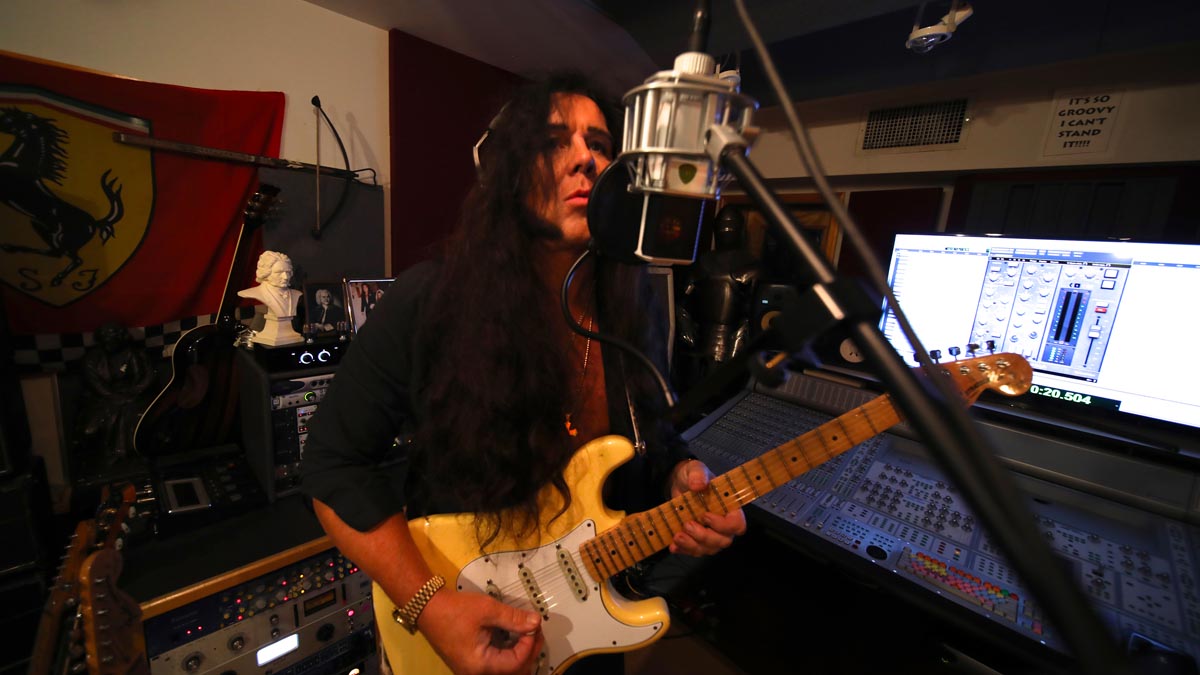
With Parabellum being a pandemic album and you being so classically minded, one imagines you cast in the role of Guillaume de Machaut, hiding from the Black Death at the Cathedral of Our Lady of Reims to write Le Messe de Notre Dame.
“[Laughs] You know what? I think that you are partially right about that! I learned many years ago that, when it comes to recording – not so much writing but recording – too much time can be a really bad thing. Yes, it can. But luckily I have sussed that out. I learned very many years ago that, if you keep doing takes, keep doing takes, keep doing takes, they don’t get better. They just don’t get better.
Want all the hottest music and gear news, reviews, deals, features and more, direct to your inbox? Sign up here.
“All my solos are improvised. They are not written out. They are not pre-mapped out, nothing. Obviously, I know which key I am in. I know the chord progression. I know that. But that is about it. I create on the spot. Things like all the fast stuff, the arpeggios, and the vocal parts, stuff like that, then I will just do it until it is right, but with the solos I have to find a really magical moment to get it right.
All my solos are improvised. They are not written out. They are not pre-mapped out, nothing... with the solos I have to find a really magical moment to get it right
“It’s the same with writing. I find that writing is something that has to be spontaneous otherwise it doesn’t it excite me. Because I could literally write anything I want, and do anything I want. If you asked me to write a death metal or a country song, or a reggae song? Yeah, yeah. Call me back in 10 minutes. Done! No problem. But that doesn’t excite me. That’s not something that I would go, ‘Oh my God!’ That is something that comes to me like a gift, like someone has given me something, and I just kinda grab it and make it mine.
“So time is good but unless you use it the right way it can actually be bad. And also, where I live, there was never any lockdown. The only really, really true impact on my day-to-day life so to speak with this horrible pandemic was the fact that I wasn’t touring. But I am back now!”
It’s funny, because Parabellum is a studio album, but it sounds like a live performance. But then everything you do is like a performance – long ago, you spoke about how important it is to practise as though you were performing for an audience. That sensibility comes through on this recording.
“Wow! You have on idea how good that makes me feel to hear that. Thank you. Because when something sounds stale, I don’t like it. I would rather have a mistake in an exciting part than something that sounds perfect. So thank you.”
Well it’s there’s always the balance between playing things correctly and performing them – the latter requires an element of risk. But you don’t make it easy for yourself because your tone is very clear, the overdrive very natural, and you once said having high action helped give your sound this acoustic quality. Could you talk a bit about your philosophy when it comes to tone?
“Something really weird happened to me when I was just a little kid. I got my first guitar when I was five. I started playing, really playing – 10, 12 hours a day – when I was seven years old. They literally thought I was crazy. ‘This kid is fucking crazy!’ they thought. I wouldn’t do anything else. I learned to play all those blues likes and scales in a couple of days, y’know. And so, after I learned how to play all the blues licks and all that, little by little, I was struggling because I felt like I had climbed a little hill, but I wanted to climb Mount Everest.“
Don’t get my wrong, I fucking love Deep Purple. I think they are amazing. But I wanted to branch out
Mount Everest being something classical?
“I always felt there was something [else] but I didn’t know what it was. Then, when I heard baroque classical music I realised that that makes it more challenging. All of a sudden I have to now think about inversions and all this stuff that wasn’t in the lazy rock guitar. Don’t get my wrong, I fucking love Deep Purple. I think they are amazing. But I wanted to branch out with the notes. There are 12 chromatic notes in the octave – obviously you don’t want to play [all] that unless you want to play bebop, but there are more than five. That’s how it started.“
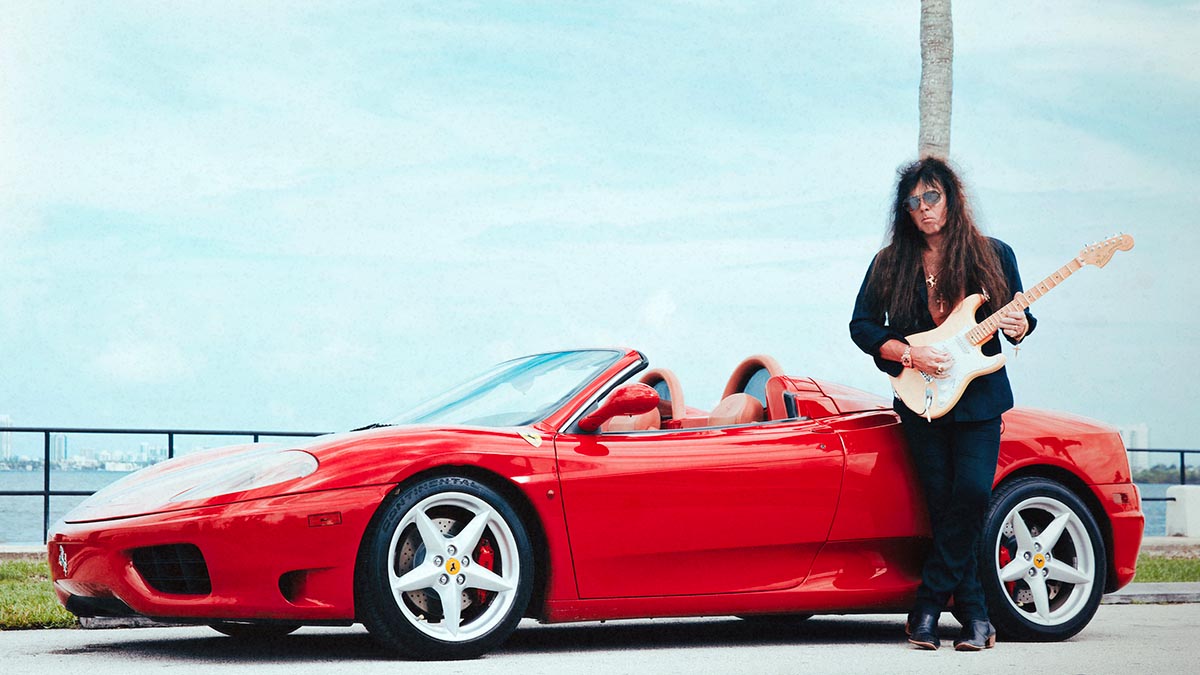
It was Genesis that turned you on to classical music?
“I heard Selling England By The Pound by Genesis… I go, ‘What the fuck’s this?’ And then I realised that it was mostly Bach, and my mother had hundreds of baroque record. I already had the Marshall stacks [in mind]. I was only a little kid but I had the electric guitar, I loved the smoke machines, the double-bass drums and stuff like that. But I liked the [classical] notes.
You just don’t say, ‘Yeah, I want to play Paganini, Tchaikovsky, Vivaldi violin technique on guitar.’ That’s literally impossible... but I decided, even if it was literally impossible, I was gonna f**king try
“When I was 12, I saw Niccolò Paganini’s 24 Caprices on TV, and I didn’t know what it was. This was before video recorders so I recorded it with a microphone and a tape recorder, [laughs] and then they said, ‘This is Niccolò Paganini’s 24 Caprices’ and I went out and fucking bought it. And this is comes back to what you were saying about tone...“
That's right, the acoustic quality of your electric guitar tone...
“I realised that that violin sound, the wee-eee-eee-eee, like, this linear, completely concise sound, that’s what I heard in my head, that’s what I wanted to do! And so it was like a fucking revelation, y’know, and obviously, you just don’t say, ‘Yeah, I want to play Paganini, Tchaikovsky, Vivaldi violin technique on guitar.’ You don’t say that. That’s literally impossible to be honest with you. But I decided, even if it was literally impossible, I was gonna fucking try.
When Van Halen came out – and God bless him, I loved him to bits – I refused to hack my Strat up and put a humbucker in it because everyone else on the planet did
“I started including all the arpeggios, all the linear scales that I had heard, and this is where it ties into what you said about the tone. On a Fender Stratocaster, you have what is known as single-coils. Now, single-coils hum like a bastard. That’s a bad thing. But what they have is a certain magnetic window, which is one line, one very precise line of pickup. The way the guitar string vibrates exactly above that pickup is all you get. You kind of lose a little bit because you don’t get all the harmonics.“
But you have precision, more clarity...
“With a humbucker, most people sound really good because they have a natural warmth and have all these cool harmonics, and that Van Halen thing, which I love. When Van Halen came out – and God bless him, I loved him to bits – I refused to hack my Strat up and put a humbucker in it because everyone else on the planet did. And that was a big deal for my sound.
I have more fucking gain than a nuclear power plant! I have so much f**king gain, I don’t know what to do with it!
“People would say, ‘He sounds different… Different! Clean!’ I remember, when I first came on the scene, people used to come up to me and say, ‘I can’t believe you don’t have any gain on your amp. You don’t have any distortion!’ You know what the truth of the matter is? I have more fucking gain than a nuclear power plant! I have so much fucking gain, I don’t know what to do with it!
“But it is a combination of the single-coil magnetic window – which I now have a stacked single-coil – and playing precise, not letting notes bleed into each other. If you are playing an arpeggio you can’t play it like a chord. You’ve got to keep those notes separate, and the faster you do that, the more difficult it is to do it cleanly. That is what I heard in my head, so it is a combination of all of that, all that came to be my sound.”
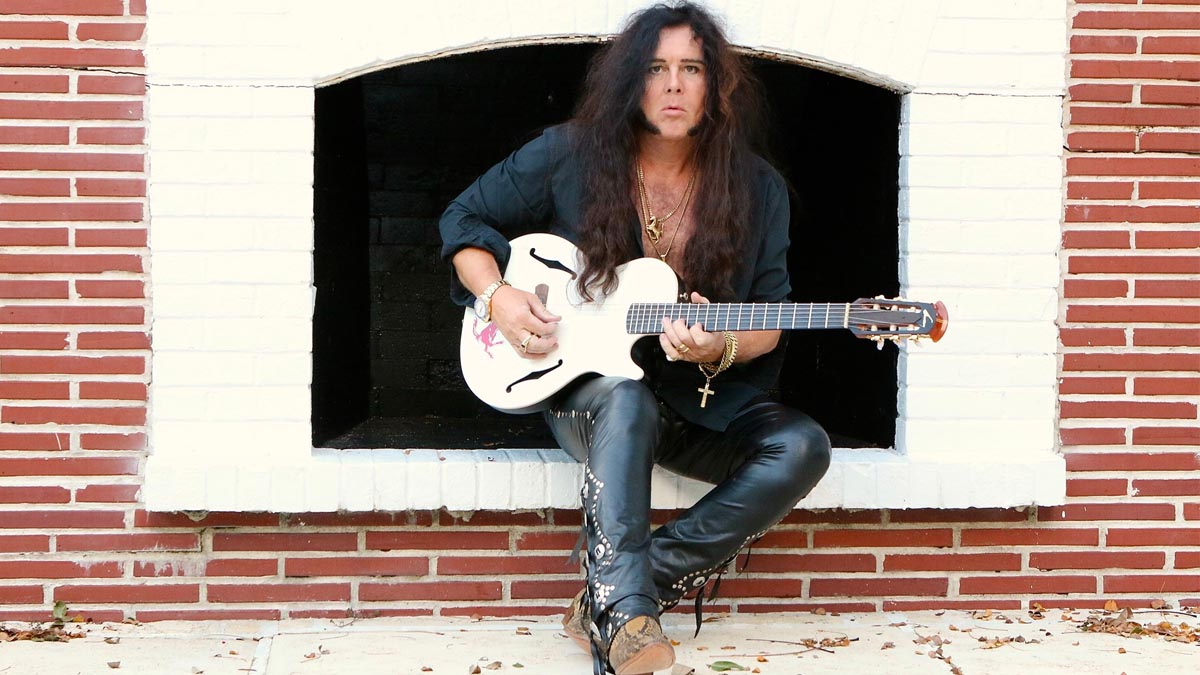
You sound is very different in that respect, with no hiding place for mistakes.
“I also found out one more thing, and it was an accident. I think I was about 11. Marshall started building amps that had a master volume on them and they were all the rage because you could get all that dirty distortion without volume, so all the four-input Marshalls, the Plexi amps, were like 50 bucks, and so, guess what I did? I snapped them all up, and all of a sudden I had more Marshalls than everybody else. But I had the Plexi ones that no one fucking wanted. Of course, now they are the most expensive ones but that’s besides the point, what I am trying to say is that also was a factor in all of this.“
Because if you want gain, you're going to have to have volume, and lots of it.
“If you have an amp that is built with a preamp and a power amp, you can have a very high level on the preamp, and obviously you don’t want the level too high, so you turn down the master volume so the power tubes are hardly on. Whereas, on a linear 1959 Marshall, you plug in your guitar in the input and you have one volume control and you have to put it all the way up.
“What happens then is the preamp and the power amp distort – they both work equally in a linear fashion. Then out of the speaker, of course, you get something that is like 110dB, 120dB, and a lot of people can’t have that.“
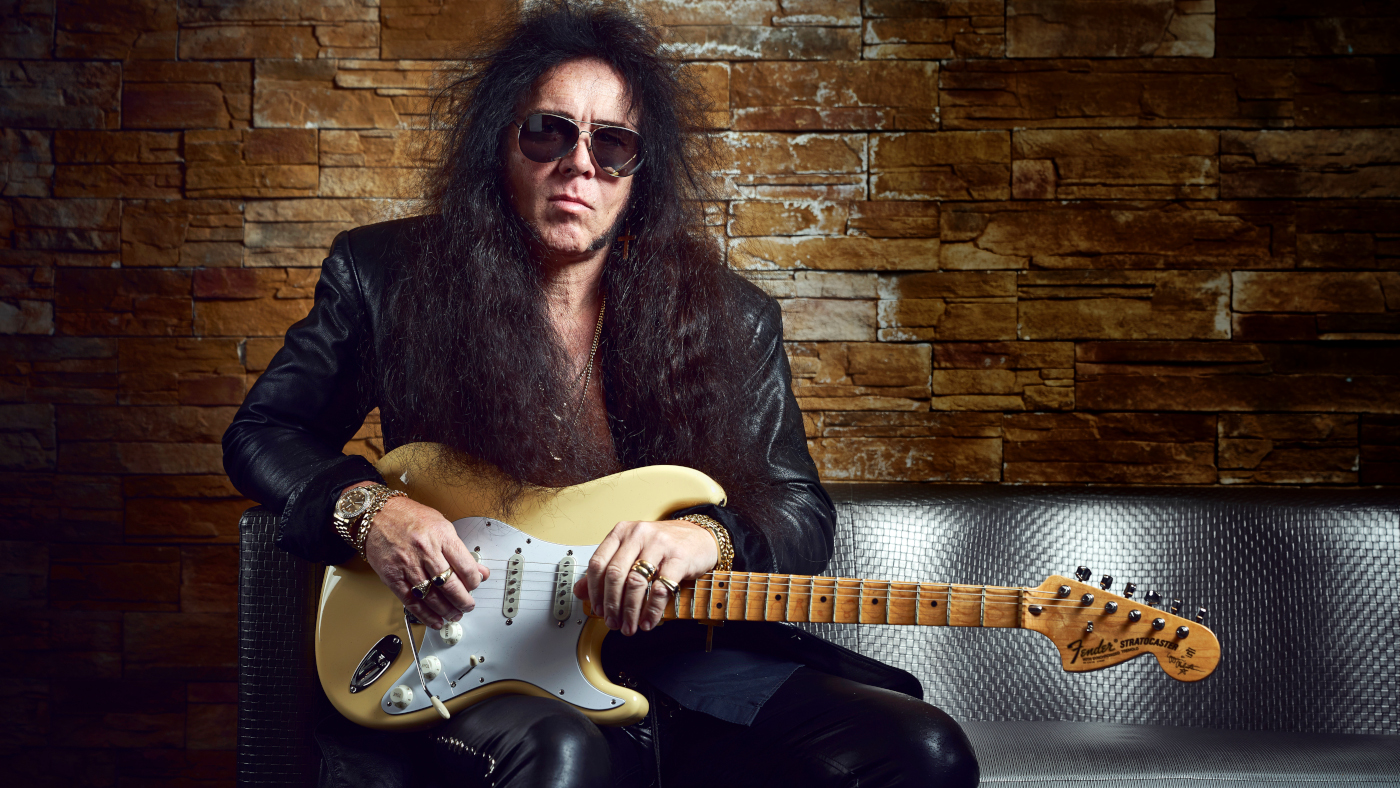
For many players, that's just too impractical for most situations.
“I have the luxury of having that in the studio and onstage. I play extremely loud but that is also part of the sound. The way that the Marshall works is with the EL34s and the preamp tubes working together to get that singing sound. It all plays a role.
“I run them through a 300-watt cabinet. A lot of people go about talking about the [Celestion] Greenback speakers which have a certain breakup in the cone – I don’t like that. I like a completely colourless reproduction of the amp so when you’re listening to it it is heavy as fuck.
“In fact, a funny story: when I did a tour with Generation Axe, and we were all playing together, Tosin Abasi always stands in front of my amps when we played together, and he has never done that before because he is younger. He has always used the Fractals and stuff like that. He said, ‘Dude! Your sound is fucking physical, man! It’s like… a physical thing, man. What the fuck!?” [Laughs] I said, ‘Yep, that’s what it is!’ [Laughs] That’s why I turn it away from myself!”
Tosin is right. It is a physical thing. It's animalistic. Learning to play with volume is such a big part of electric guitar playing. Half the time you are trying to get it to shut up.
“It’s funny you should say that, because I did a gig last weekend – I did two gigs and I was so happy because it has been so long. I said to my tech, ‘Before I go out, I want to line check my shit to make sure it works. Make sure you get the elephant.’ The elephant means that when you just stand there in front of the amps and you turn up the volume, and do nothing, it should sound like an elephant. Waaaaaaaaaaaaaarghhhh! Uncontrollable fucking elephant. But you have to be really fast with the volume knob, you know what I mean?
“Like I said, I use a lotta fucking gain! But I don’t use distortion. I use a boost, the boosted signal goes into the Marshall then the Marshall and the volume does the rest. I have the luxury of having the same procedure done in the studio also. In my control room, I have [laughs] 62 Marshall heads. [Laughs] I have a place downstairs, it is called the Room of Doom, and that is like a wall of Marshall speakers, and I mic them up, a full fucking wall of them. So, I am sitting in the control room and I get that same sound without any problems.
“It is really, really good, because some people, either they like to do different things live than in the studio or they have to different things, like, back in the day, they didn’t let you turn up in the studios. However, I like it to have the same sound. I like to do the same thing.”
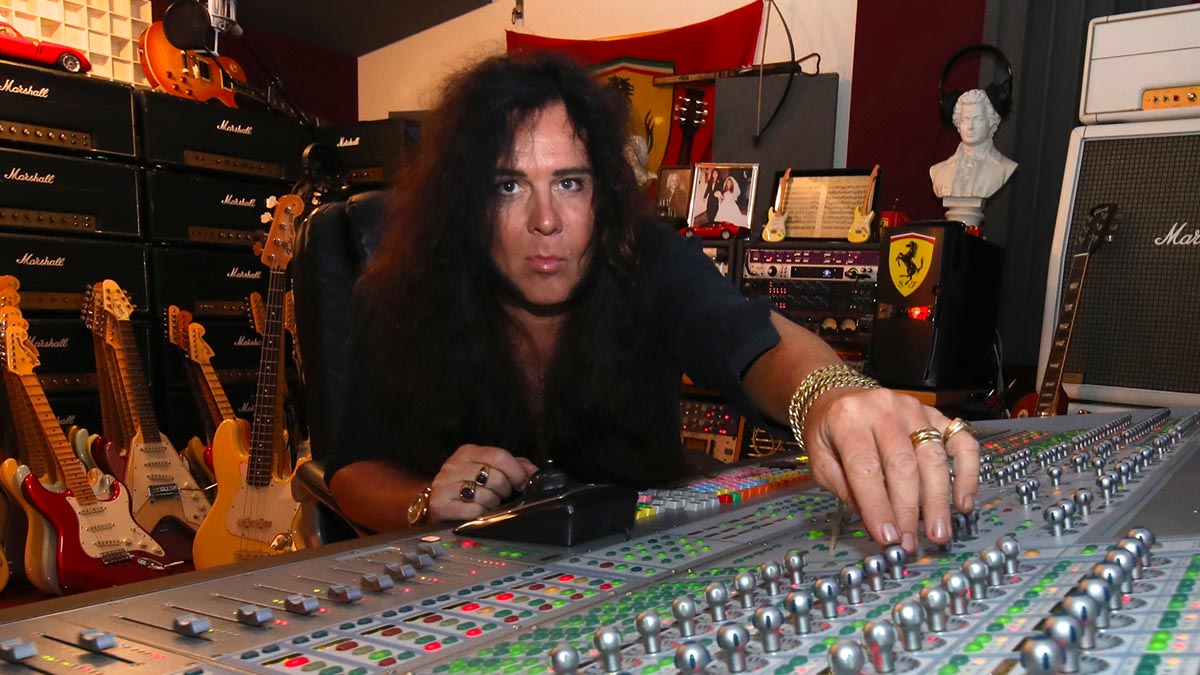
This is the irony of modern life – there are not stage volume limits. If you want to get dangerous with volume, you have to do it in the studio. You can do anything there. Indeed, you have. Didn’t you trigger the drums with a hand gun on this record? Please say this is true.
“Indeed, I did! It’s so funny! Back in 1986, in fact, maybe it started in 1984, sampling triggering technology. It was a thing called an [E-mu] Emulator, a blue keyboard, and you could actually take a signal and have that signal trigger anything – it could be a glass breaking, or the sound of screaming, whatever, and this was a big deal then.
“I have always been collecting guns. I always have lots of guns. So, I go into the studio. This was 1986, for Trilogy. [Laughs] Crazy days... I go in and I say, ‘Hey, bring me a big old fucking tree stump, y’know?’ And they said, ‘Okay.’ They put a big old tree stump in there and mic it up, and I bring out a .357 Smith & Wesson Magnum pistol and I blow this fuckin’ thing off in the studio. And the people were like, ‘No! It’s too loud.’ They’re freaking out! [Laughs]
“I said, ‘Let’s have a listen.’ And it sounded like ‘teek!’ [glass clinking] Instead of, ‘Brrrvoooom!’ Y’know!? And we did this, I don’t know, a hundred times. A few boxes of 50-round boxes. People, of course, thought I was completely fucking crazy – as per usual! For some reason we couldn’t get that sound. We couldn’t make it happen. Now, what is it? Thirty-five years later, I actually did it. I got a nice Beretta M9. I fired it. I got it well recorded, and I used it as a snare drum trigger.“
Brilliant! Where did you use that?
“Let’s see, I used it on Magic Bullet. I used it in God Particle and… What was it? Yeah, the opening of Relentless Fury! It was something I wanted to do for so long and, I guess, usually I don’t have time limits in the studio but this time there was so much fucking time [laughs] that I could bring in all these ideas that I’ve had.
I got a nice Beretta M9. I fired it. I got it well recorded, and I used it as a snare drum trigger
“That’s what I did on this album more than ever; I detailed everything. I put the CD on in the car and I would drive around, and I would listen to the songs, and I would hear an improvised guitar solo and a little melody line that I improvised, and would think, ‘Well I am going to put a harmony on that.’ All of a sudden, it worked out. Things like, ‘Oh, I think we should have that chorus at the beginning of the song.’ I did a lot of detailing, I would say, in post and during the recording, too.”
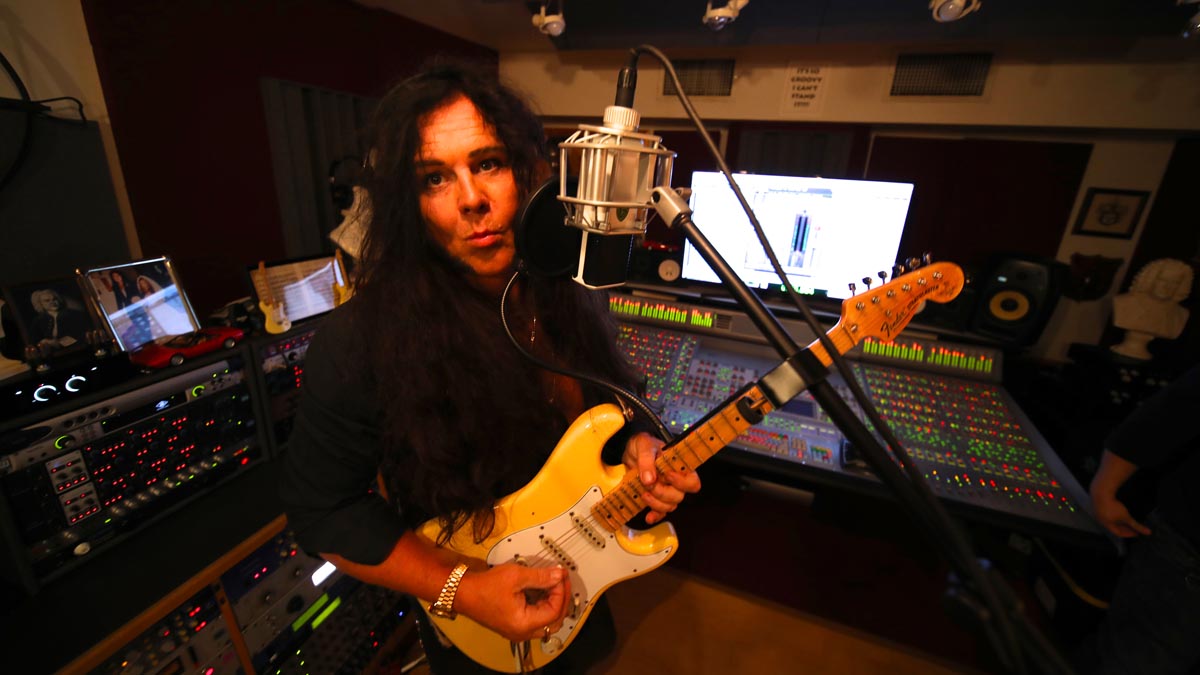
How did you get that effect on the Wolves At The Door intro?
“You know when back in the day you would play something and then turn the tape over? I did it with Pro Tools instead. That’s the one thing I love with Pro Tools. I was very late to start using Pro Tools but once I started I threw away my old tape machines. I mean, fuck this shit. Well, I didn’t throw them away but I got rid of them – they are beautiful machines; they are like Rolex watches. They are amazing. But you don’t have any sort of freedom with them…
“Each reel has 16 minutes and you can’t do and undo so if you record something and you think it is good but you try again and the second time it wasn’t as good, the whole thing is fucked. But as an artist, I realised that Pro Tools was much better. You have a lot more freedom as an artist. I don’t use it to time-stretch and pitch-correct, and shit like that, I just use it as a recorder, but a very versatile recorder.”
It frees you up to do what you want to be doing…
“Also, I used Neves, it’s all tube microphones, very, very analogue stuff like that and I have my big console for mixing. I started off with a mouse looking at the screen but I just didn’t get on with that. I am still old-school in that sense.”
Sure, use the analogue stuff where it is not going to get in the way, and where it can make a difference. Whatever works.
“You have the freedom. You write the songs and maybe I’ll write some lyrics for the song and go, ‘Oh my God! Fuck! I should have had another bar here.’ And I have to have another verse. Back in the day? ‘Too bad. You can’t change it now.’ But now, no problem. I can record something in the spur of the moment, let’s just say I pull up into the studio and record something, and it can end up on the album. That’s the beauty. For creativity, and inspiration, it’s fucking amazing.
“My uncle built a recording studio before I was born – back in the 50s – and I got to use that. It was like, ‘Let him go in there.’ My grandmother owned the building in the city, Stockholm. It used to be a bomb shelter during the Second World War that they converted into a recording studio. That is where I wrote Black Star, so I have always been recording stuff. Ever since I was little kid, I have always been into it. Because, for me, that is the best way of critiquing yourself – to listen back. Don’t critique while you are playing because it’s impossible.”
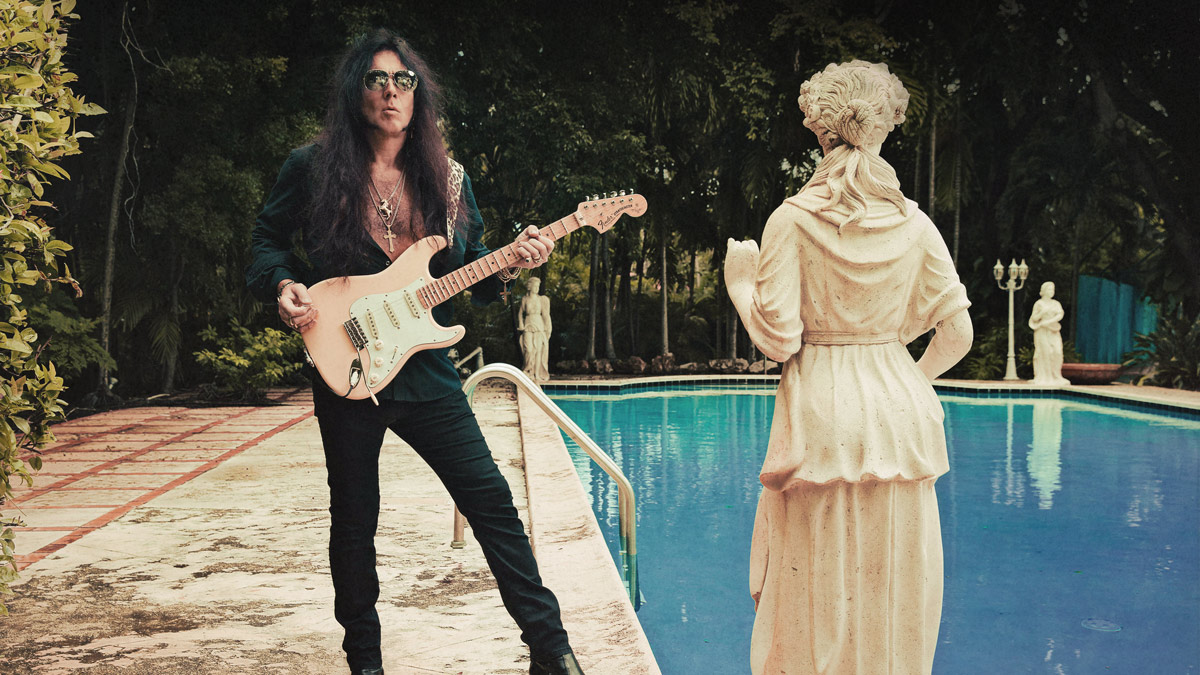
You have to shut off the critical faculty and enjoy the performance, and engage with the material, which is what we are all doing it for in the first place, right?
“That’s a great thing. You are touching on something there, because I am, for the first time in many months now, I have actually been touring – just staying in Florida and Texas for now because the rest of the country is not open yet. I found myself playing stuff and I would almost have an out of body experience onstage. When that happens, that’s the greatest thing ever. I basically wasn’t playing; I was listening, like someone else was playing! But that’s also a danger, because then you can fuck it up real bad! [Laughs] A lot of things can happen but in order to get good you have got to take risks.”
- Parabellum is out now via Music Theories Recordings.
Jonathan Horsley has been writing about guitars and guitar culture since 2005, playing them since 1990, and regularly contributes to MusicRadar, Total Guitar and Guitar World. He uses Jazz III nylon picks, 10s during the week, 9s at the weekend, and shamefully still struggles with rhythm figure one of Van Halen’s Panama.
